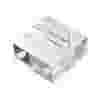KEY FACTS:
- Transparent and clear available
- Lightweight
- Shatter resistant
- Excellent impact resistance compared to glass
- Weather and UV resistant
- Is recyclable depending on local and regional guidelines

Acrylic (aka, polymethyl methacrylate (PMMA)) is one of the most popular plastics for CNC machined parts, particularly in medical and diagnostic applications. Known as a transparent thermoplastic, it machines well, holds tight tolerances, is relatively low cost, and offers optical clarity if needed.

Acrylic material comes as either cast or extruded. Many use cast acrylic in CNC machining applications because it is stable and available in a wide range of sizes and configurations. For the usual stock plastics shapes, cast acrylic is readily available in all sheet sizes, including extra-thick material above 4 inches. It is also possible to source rods and tubes. Extruded acrylic is typically used in sheet applications and is only available in thinner gauges. By comparison, extruded acrylic is lower in cost and more impact resistant but softer than cast.
Cast acrylic for machined plastic parts come as both domestic-grade and import-grade. Import-grade acrylic is significantly lower in cost than domestic-grade. However, be warned the dimensional stability and stress-cracking resistance of import-grade are lower than domestic-grade. Whether you’re sourcing domestic-grade or import-grade acrylic for your plastic machining needs, the basic cost of either is about 15 -25% higher than Delrin in the lowest quartile of machined plastics. See all material costs comparisons here.
Acrylic is also available in a wide range of colors, both opaque and translucent. Since many use this plastic as sheet material for signage, it has the broadest range of hues on the shelf.
For machining considerations, acrylic has its place in the world of plastics. As it's a harder material than most, it has an excellent ability to hold close tolerances. On smaller dimensions, tolerances of +/- 0.0005 inches are possible, but machines can be even more precise than that. Finishes directly from a machine tool can measure less than 2 micro inches Ra. A 32 Ra-max finish for an entire part. For most machining vendors, this should be standard.
Controlled Fluidics' experienced machinists can produce a smooth, burr-free finish, even when the part requires a complex geometrical design with cleanly drilled intersections.
Lastly, on the ease-of-machining scale (stability, abrasiveness, burr formation), acrylic machining is a 3.7, landing in the lowest one-third of stock shape plastics.
REACH OUT TO US